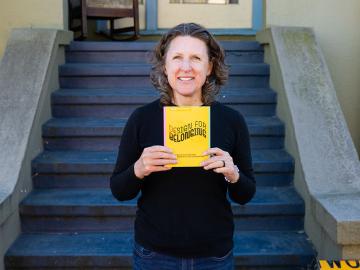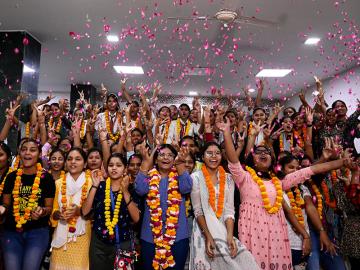Will there be a respite from the ongoing Covid-19 spike?
Experts say the new sub-variant of the coronavirus is highly infectious, but not deadly. As Covid vaccine makers decide to supply only based on demand, doctors advise caution, and ask people to mask up and take precautions
A healthcare worker collects a swab sample of a woman for Covid-19 test, amid a rise in coronavirus cases in India, in New Delhi on April 17, 2023. Image: Arrush Chopra/NurPhoto via Getty Images
This time two years ago, India was descending into its deadliest Covid-19 crisis. It was at the doorstep of a second coronavirus wave that would lead to people scrambling for oxygen and hospital beds, and high death tolls. Two years later, in 2023, there is another coronavirus surge, this time led largely by the Omicron sub-variant XBB.1.16 or ‘Arcturus’. The World Health Organization (WHO) is monitoring the spread of this sub-variant, which experts Forbes India spoke with say is infectious, but so far does not seem to be deadly. They advise people to be cautious, and say that test positivity rates, hospitalisations and severity of symptoms need to be closely monitored.
She says the XBB.1.16 sub-variant is more infectious than seen so far. That said, according to her, natural infections—at times more than once over the past three years—plus vaccinations have contributed to better immunity in most people. At the same time, she believes the reasons for the spike in Covid cases right now could be due to the new sub-variant escaping immunity, the low booster dose acceptance among the population, and also people letting their guard down in terms of taking precautions like masking.
Data from the past few days shows that while the average daily case load is around 9,000 to 10,000 cases, the number of deaths, on an average is 20 to 25 people. According to Dr Jeenam Shah, consultant pulmonologist at Saifee and Jaslok hospitals in Mumbai, while the sub-variant is not likely to cause massive disruptions in India, and most people can get treatments at home while practising isolation, he believes that senior citizens and people with comorbidities should be careful. “We have seen this pattern in the influenza virus—it is endemic, it will come in spikes, trouble us for a couple of months, and die down on its own. That is the same thing I feel will happen with Covid. Because mass vaccination has happened, mass infection has happened, the severity is not going to be that worrisome,” says Shah.
Also read: Covid-19: Is the worst behind us? Maybe not
Experts are keeping an eye on the total positivity rate (TPR), which means the number of people testing positive for every 100 tests. As per WHO, a TPR of less than 5 percent is an indicator that the infection is under control in a geographical locality. In India, as per health ministry data on April 18, the daily test positivity rate in India stood at 3.62 percent, while weekly test positivity rate stood at 5.04 percent.
Where do we stand with the vaccination?
As the number of cases start increasing, the focus turns to vaccine availability, and whether there will be an uptick in the demand for precautionary doses, which has seen low coverage in the country.As per the health ministry’s report on cumulative Covid-19 vaccine coverage, about 220 crore total vaccination doses have been administered in India as of April 18. While about 86 crore adults have taken the second dose, only about 23 crore adults have taken the precaution dose.
Vaccine makers say they will only supply vaccines as per demand. “Bharat Biotech has destroyed approximately 50 million doses of Covaxin over the past few months, due to non-procurement, at a great loss to the company. Covaxin is available for supply based on demand,” says a spokesperson from Bharat Biotech, which manufactures Covaxin, and the nasal Covid vaccine INCOVACC. “There have been several requests for large-scale supplies of INCOVACC, and we will develop an antigen bank of 10 million doses as a stockpile.”
Also read: His Father Built A Vaccine Empire. Adar Poonawalla Is Now Busy Diversifying It
As per several media reports, Adar Poonawalla, CEO, Serum Institute of India, told xx that the company has resumed the production of the Covid-19 vaccine, Covishield, in response to the increasing number of coronavirus infections. The company also has six million doses of the Covovax vaccine, which are readily available to private hospitals depending on the demand, and can also be used as heterologous booster doses. “The company has taken this precautionary measure to ensure that people have the option of Covishield if they choose,” says a company spokesperson.
As of now, the government’s stance is that there is no need for additional annual booster doses for those people who have already received the precaution dose. Dr Shah believes that the recommendation to make Covid vaccine annual is “not likely to come soon as we are too early into the endemicity” and more data would be required to take such a call. He explains that as of now, there is no clarity on whether the vaccines will cover the new variants of the coronavirus, but health experts agree that vaccinations definitely help in reducing the severity of the infections. “Earlier Covid strains have been covered in the vaccines, and preventing the severity should be the goal. We cannot prevent the infection itself, but we can mellow it down by taking the vaccine.”
Dr Solao says that in the West, people have already taken a fourth booster dose, but in India, the Indian Council of Medical Research says there is no evidence that a fourth booster dose will help. “A third booster dose of the vaccine for people in high-risk categories is a must at this point,” she says, maintaining that there are no foolproof models yet to predict when the infections will peak, but past waves can act as a guide. “The situation is not alarming,” she believes. “There is no need to panic.”
Check out our Festive offers upto Rs.1000/- off website prices on subscriptions + Gift card worth Rs 500/- from Eatbetterco.com. Click here to know more.















